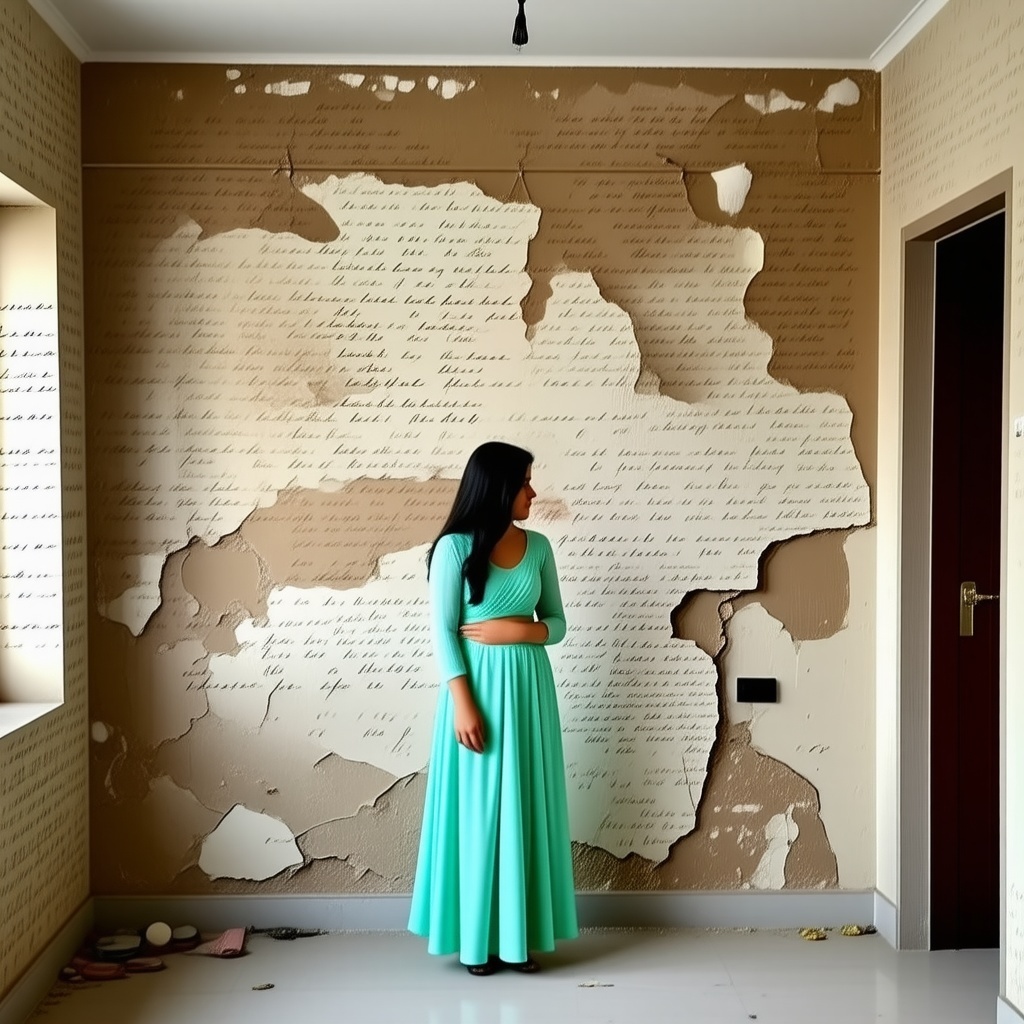Nupur had always felt like a borrowed character in someone else’s book. She moved through days like a line in a half-finished sentence—paused, expectant, unclaimed.
She was twenty-nine and lived in an apartment that looked like it belonged to a substitute teacher who never got tenure. Dusty blinds. A water stain in the ceiling shaped like a violin. A wall of unread books she couldn’t bear to give away. She kept them because she believed one day they would speak to her differently—when she was ready to hear them.
The peeling wallpaper had nothing to do with it. Not at first.
But one night—one unremarkable Tuesday—she couldn’t take it anymore. That one stubborn corner that kept curling. She stood up in her pajamas and tore it down.
Underneath: handwriting. Not painted. Not scribbled with a Sharpie by a rebellious tenant. Pencil. Layered. Thousands of faint, spidery lines, each one written in her own script.
The words were strange. Familiar.
She checks the wallpaper again. This time, she sees what it’s hiding.
She reads the line about the fan, the sound of bones clicking, and the sentence she’ll think is a metaphor but isn’t.
Nupur staggered back. Her heart thudded like it wanted out. She turned in a circle. Was she dreaming?
She read another line.
She doesn’t know it yet, but she’s on page 4 of something she didn’t write.
The wall wrapped around her room like a manuscript.
For three days, she didn’t leave. She uncovered every inch. The apartment became a maze of torn paper and falling plaster. Behind the wallpaper: her life. Her thoughts. Her fears. Her unfinished sentences. Her unwritten ones, too.
Some pages felt prophetic. Others felt like echoes of feelings she hadn’t allowed herself to feel. Once, in the bathroom, a line made her cry:
She wanted tenderness but feared it wouldn’t recognize her anymore.
The writing was alive. Changing.
She tested it. Wrote in her journal: She pours coffee, spills half of it, and curses in French.
Then she did. Just as written.
The wall answered:
She’s starting to get it. But getting it doesn’t mean she’s ready to change.
She wrote more. Each line was a negotiation.
Then the wall gave her a challenge.
The notebook is in the wardrobe. The one from before.
She opened the wardrobe. A box she hadn’t touched since moving in. Her college notebook, soft and bent. But the words inside weren’t the ones she remembered.
They were memories she’d never had but needed: healing conversations, versions of people who stayed, a self who laughed without flinching.
The last page said:
You’re tired of being the character. Pick up the pen.
She did.
She wrote a single line.
She calls her brother.
The phone rang. Her brother picked up.
They hadn’t spoken in fifteen months.
That night, the wallpaper stopped curling.
Nupur wrote again. Small things. Then bigger things.
She remembers the lake. The one with stars above and silence below.
She remembered.
She forgives herself. Slowly. Gently. Imperfectly.
And she did.
She wrote until the apartment glowed.
Until she could breathe again.
One day, she wrote:
She sees the story trying to finish without her. And she says: no.
The wall responded:
Then write it. But remember: what you write rewrites you, too.
Nupur paused.
She took the pen from the drawer. Not her usual black gel pen, but the fountain pen her grandmother had given her on her sixteenth birthday—the one she was too afraid to use.
The ink took longer to dry. The words looked softer, more permanent.
She wrote:
She becomes the author, not to control the story, but to stop disappearing in it.
And then:
She meets someone who doesn’t want to fix her, just read with her.
A week later, she bumped into a stranger at the second-hand bookshop she’d avoided since her breakup. They talked. About books. And silence.
And the kind of loneliness you don’t recognize until it’s mirrored.
She tells the truth, even when it shakes.
She confessed her fears in the mirror. In letters she never sent. In texts she finally did.
She lets go of the version of herself that only ever flinched.
Nupur started running in the mornings. Badly. Joyfully. She hated every step and loved the afterglow. She laughed more.
She walks into the party. She doesn’t need a reason to be there.
She went. She didn’t hover by the wall. She talked to strangers, not out of obligation, but out of hunger.
The wall kept writing, but less frequently. Fewer instructions. More questions.
What do you want next?
What would Nupur write now?
She stopped answering. Not because she didn’t care, but because she was finally listening to herself.
Sometimes she wrote things that didn’t come true. That was okay.
Sometimes she wrote about sorrow. It helped her hold it better.
She reread the old lines. Not to relive them, but to honor them.
One night, she wrote something new:
She forgives the writer who came before her. She thanks her for surviving.
And then:
She writes the next chapter as if no one is watching. Not even the walls.
She printed the pages. Folded them into an envelope. Walked to the mailbox down the street that nobody used anymore. Slipped them in.
The manuscript wasn’t perfect. It didn’t have to be.
When she came back, the wall was blank.
And for the first time in her life, she wasn’t.
She opened a new document.
Title: “Somewhere Between Drafts and Destiny.”
She smiled.
And began again.



 React
React
 React
React